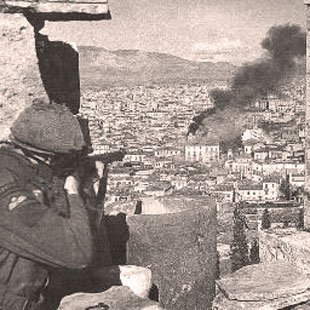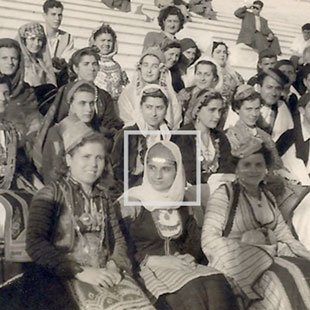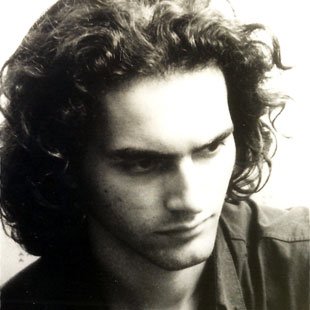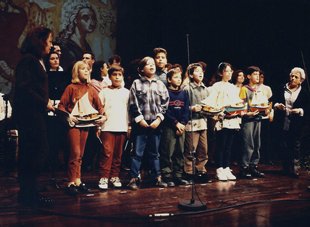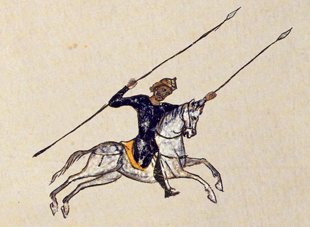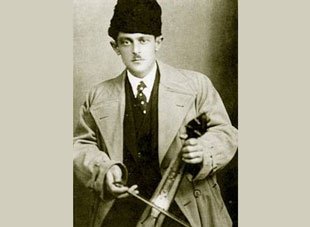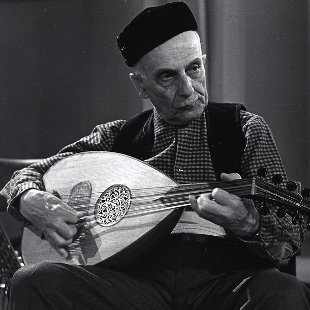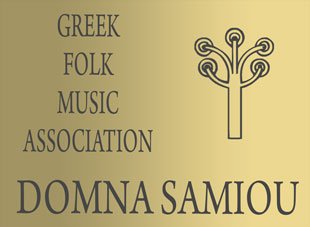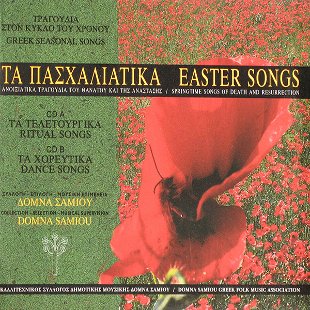You are at: Home page Her Work List of Songs Glory Be to Every Day
Priests' Dance
Δόξα να ’χει πάσα ημέρα
Listen
Lyrics
Glory be to every day and to the Son and Father
and to the Holy Spirit that’s divine and life-creating.
Glory be to all the three and to the Virgin Mary,
in heaven all is ease and dance, led by the Lord’s Apostles.
In total they add up to twelve, the dance is led by Peter
while Paul has Andrew follow him, the other nine come after.
Now Philip fastens on to John, with Thomas in the middle,
and next comes Mark in hearty mood, then Simon leading Matthew,
while Jacob’s linked to Matthew and Bartholomew the endmost.
The Prophets chant antiphonals and sing the daily office.
See, David plays his famous lyre, Isaiah the kinýra1
and Zacharia the órganon2 the harpist’s Jeremiah.
The Virgin Mary, chaste and pure, immaculate and Mother,
dispatched the four Evangelists to issue invitations.
First Matthew went at her command and John the Lord’s Precursor
to summon Anna to the feast and Joachim, Susanna,
Elizabeth and Zacharia, and Mary Magdalene,
the seventy Disciples and all who are crowned with glory.
Then Stephen and the Martyr saints, the choirs of poor physicians,
and Hierarchs, the blessed and the saints in twenty thousands.
The virgin martyr Catherine, with Thekla and Justina,
Paraskevi, Anastasia and Mary the Egyptian.
And all of them were in great haste to reach the Queen of Heaven:
the faithful who frequent their church receive an absolution.
Whoever humbly signs himself will have the Cross protect him,
whoever acts in charity invites God’s peace upon him.
Whoever speaks no evil words will one day live in Heaven,
so there, my children, take good care and always do my bidding.
We all must love each other well if Paradise we’d enter.
And next year too enjoy good health and happiness in plenty.
Translated by John Leatham
1kinýra: a string instrument played in antiquity and the Byzantine age, resembling the guitar
2órganon: another similar string instrument
Original Lyrics
Δόξα να ’χει πάσα ημέρα
Δόξα να- δόξα νά ’χει πάσα ημέρα,
δόξα νά ’χει πάσα ημέρα κι ο Υιός με τον Πατέρα
και το Πνε- και το Πνεύμα το Αγίο,
και το Πνεύμα το Αγίο, το ζωαρχικό και θείο.
Δόξα νά ’χουν και τα τρία και η Δέσποινα η Μαρία,
στ’ς ουρανούς χορός και σχόλη, τον κρατούν οι Αποστόλοι.
Δώδεκα είναι και στο μέτρος, σέρνει τον χορόν ο Πέτρος,
πιάνει ο Παύλος τον Αντρέα και οι άλλοι οι εννέα.
Φίλιππος τον Ιωάννη και Θωμάς στη μέση πιάνει,
τότε Μάρκος με καρδίαν, Σίμωνα και τον Ματθίαν.
Ιάκωβος πιάνει Ματθαίον, έτερος Βαρθολομαίον
κι οι Προφήται τραγουδούσι, ψάλλουν και καλαναρχούσι.
Ο Δαβίδ παίζει την λύραν, Ησαΐας την κινύραν,
τ’ όργανον ο Ζαχαρίας, άρπαν παίζει ο Ιερεμίας.
Κι η παρθένος η Μαρία, η αμόλυντος Κυρία,
έπεμψε για καλεστάδες, τέσσερας Βαγγελιστάδες.
Τον Ματθαίον πρώτον βάνει, Πρόδρομον τον Ιωάννη,
να καλέσουν και την Άνναν, Ιωακείμ και την Σωσάνναν.
Ελισάβετ, Ζαχαρίαν, την Μαγδαληνήν Μαρίαν,
τσ’ εβδομήκοντα Αποστόλους και τους αθλοφόρους όλους.
Στέφανον και των Μαρτύρων, τους χορούς των Αναργύρων,
ιεράρχας και οσίους και αγίους δισμυρίους.
Μάρτυρα Αικατερίνην, Θέκλαν και την Ιουστίνην,
Παρασκευήν, Αναστασίαν, την Αιγυπτίαν Μαρίαν.
Κι όλες με σπουδήν κινούσι, την Παντάνασσαν να βρούσι,
κι όποιος πάει στες Εκκλησίες, φεύγει από τες αμαρτίες.
Κι όποιος κάνει το Σταυρό του, άρματα έχει στο πλευρό του,
κι όποιος κάνει ελεημοσύνη, βρίσκει εκ Θεού ειρήνη.
Κι όποιος δεν κακολογήσει, εις τους ουρανούς θα οικήσει,
το λοιπόν και σεις παιδιά μου, κάνετε το θέλημά μου.
Όλοι να αγαπηθούμε, στον παράδεισο να μπούμε
και του χρόνου με υγείαν και με πάσαν ευτυχίαν.
Information
- Region: Ionian islands
- Area: Corfu, Klimatia
- Type: Religious, Literary
- Categories: Easter Song, Ritual Song
- Rhythm: 4 beats
- Dance style: Local dance
- Duration: 04:33
Collaborators
- Singer: Fragiskos Fatouros
- Choir: Domna Samiou Greek Folk Music Association Choir
- Informant (source of the song): Father-Alexandros Filippakis
Albums
Notes
Its religious character determines that this dance-song should be either the first to be danced once the prohibitions of Lent are lifted, in other words at Easter, or the final dance at the end of Carnival, as is the case in Corfu island. There, after vespers on ‘Cheese-eating Sunday’ (which precedes Clean Monday, the last day of Carnival and the first of Lent), the priests perform that particular local dance, sometimes in the church itself, as at Nyphes, sometimes in its forecourt as in the villages of Episkepsi and Klimatia. The eldest priest leads the dance and is followed by the remaining clergy and the members of the village council in the order established by their age. The song accompanying the dance is sung antiphonally by the dancers themselves, the leading dancer being the first to sing a verse and the others repeating it. The locals call the song a ‘glorifying’ song or an encomium. Miranda Terzopoulou – Zoe Margari (1998)
Recording information
Studio recording, 1997.
Father Alexandros Philippakis sang this song in the Corfiot village of Klimatia in 1994; he was taped by Eleni Vassiliou.
Member Comments
Post a comment
See also


Singing Spring
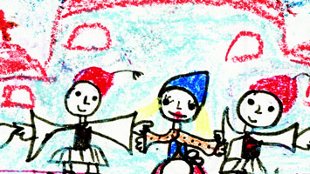
Song
An Orange Joined the Dance
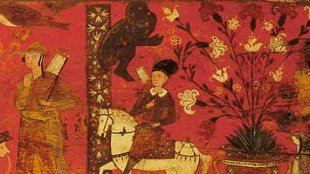
Song
Arta’s Bridge
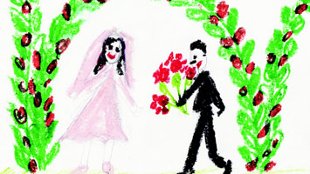
Song
I Climbed up the Cherry-Tree

Song
It Is May Month

Song
Maria’ S Gone to Pick Some Lilac

Song
My Son, Why Dont You Go and Wash?

Song
Now Hear Me,…

Song
One Easter Day, One Sunday
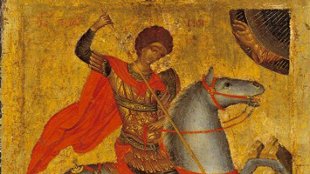
Song
Song of Saint George

Song
Today, dear George...

